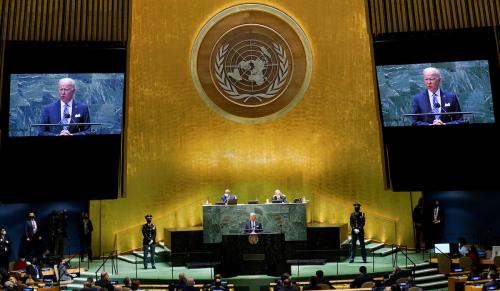It’s all so predictable. A liberal Democratic President proposes substantial increases in taxes on the rich, increased tax breaks for the middle-class and poor, a universal program for free attendance at community colleges (to go with a previous proposal on universal preschool), and incentives for businesses and governments to adopt paid sick leave and medical leave policies. A rough calculation indicates that these and other Obama proposals will increase federal spending by as much as $175 billion over ten years. Whatever else these policies might achieve, they expand the reach of government, increase spending programs, and shift the tax burden in the direction of the rich to the benefit of the middle class.
Meanwhile, Republicans will oppose all these proposals. In fact, it would be difficult to create a menu of policies that would be more inconsistent with Republican priorities. The $320 billion or so in tax increases on the rich accompanied by tax breaks for the middle class is a nonstarter and has already been characterized by Republican leaders as setting one group of Americans against another. The universal program for free tuition to community colleges not only increases government spending by around $60 billion over ten years, but is also partially redundant with the $25 billion Pell grant program. Policy to expand paid sick days and paid medical leave has been a bright line between Republicans and Democrats for two decades, with Republicans resisting attempts to expand the current modest policy that provides unpaid leave only to workers in companies with more than 50 employees.
It appears that in adopting this expanded version of tax and spend, Obama made a calculated choice. A major strategy in the liberal playbook is to help people, especially the poor and middle class, by creating spending programs. But to do so, they either have to increase the deficit or raise taxes. Last night, Obama solved this dilemma by proposing to increase taxes on the rich and spend the money on social programs designed to help the middle class.
An additional justification for tax and spend that is consistent with changes in the distribution of income has been boldly asserted by Obama and many Democrats since at least since Obama’s famous 2011 speech on inequality and helping the middle class in Osawatomie, Kansas. There is no doubt, as shown by numerous government studies, that income inequality has exploded in recent decades. The top one percent of households has doubled its share of national income since 1979 for example. And Obama’s agenda is certainly responsive to this rise of inequality, which Obama declared to be the “defining issue of our time” in his Osawatomie speech.
What’s predictable is that Obama would lay out such an aggressive tax and spend agenda and that it would resonate with most Democrats. What’s equally predictable is that Republicans will reject most of the Obama agenda. What happened last night is simply a clash of the basic philosophies of the two parties.
What now? Based on the confrontations invited by the President’s speech last night, nearly all of his proposals will be rejected or ignored by Congress. Republicans will focus on running the Congress in businesslike fashion while conducting an ongoing verbal battle with Democrats and the President. But the odds of bipartisan action on immigration, reform of the tax code, reducing the nation’s debt, or other major issues over the next two years have been greatly diminished. Expect little or no progress on the major problems facing the nation, including the growing national debt which is lurking in the shadows only to reappear down the road. It’s all so predictable.



Commentary
It’s Predictable
January 21, 2015